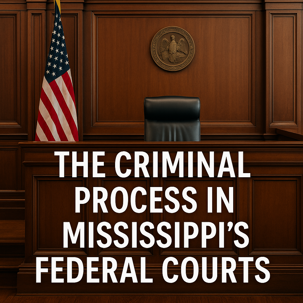Federal criminal charges carry weight far beyond most state prosecutions. The investigation is longer. The stakes are higher. And the consequences—mandatory minimums, guideline sentencing—can upend lives. If you or a loved one faces charges in Mississippi’s federal courts, understanding the process can help you navigate what’s ahead.
What Makes Federal Criminal Cases Different?
Federal and state courts operate under completely different systems. Here’s how:
Jurisdiction – Federal courts handle cases involving U.S. laws, interstate crimes, or offenses on federal property.
Agencies – Expect investigations by the FBI, DEA, ATF, or IRS rather than local law enforcement.
Prosecutors – U.S. Attorneys, not Mississippi district attorneys, lead these cases.
Rules & Procedures – The Federal Rules of Criminal Procedure govern every step.
Penalties – Federal sentencing guidelines can impose strict mandatory minimums.
This means that defenses and strategies that work in state court may not translate to federal court.
Step 1: The Investigation
Federal investigations are often lengthy and covert. Agents may spend months building a case—collecting evidence, issuing subpoenas, and using confidential informants—before you ever know you’re a target.
If you suspect you’re under investigation, don’t wait for an indictment. Contacting a federal defense attorney early can protect your rights.
Step 2: The Indictment
Federal charges often begin with a grand jury indictment. This is not a trial; it’s a closed proceeding where prosecutors present evidence to a group of citizens. If they find probable cause, the grand jury issues an indictment.
You may first learn about it when federal agents show up at your door.
Step 3: Initial Appearance and Detention Hearing
After arrest, you’ll appear before a U.S. Magistrate Judge to hear the charges and decide on pretrial detention.
At the detention hearing, prosecutors often argue that you should remain in custody as a “flight risk” or “danger to the community.” Your attorney can present evidence to counter this and push for release pending trial.
Step 4: Pretrial Motions and Discovery
During this phase, your lawyer can:
Challenge the admissibility of evidence (e.g., unlawful search and seizure).
Seek dismissal of flawed charges.
Demand discovery to review the government’s evidence and prepare for the possibility of a trial.
This stage often shapes plea negotiations.
Step 5: Trial or Plea
Most federal cases end in a plea agreement, but you must prepare as though trial is inevitable. Trials in U.S. District Court involve strict rules of evidence and procedure that require an experienced federal litigator.
If convicted, sentencing follows the U.S. Sentencing Guidelines, which take into account offense level, criminal history, and statutory enhancements. The Guidelines Manual's size reflects the complexity of federal sentencing: it looks like a 1990's era New York City phone book.
Why Federal Defense Experience Matters
Federal prosecutors don’t bring cases unless they believe they can win. They have resources and time that state prosecutors often don’t. To level the playing field, you need a lawyer who understands federal court—its rules, its culture, and how to craft a defense strategy that works at this level.
At Eichelberger Law Firm, we have experience defending clients in Mississippi’s federal courts. We know how to challenge federal prosecutors and protect your rights.
Call Us Today
If you’re facing federal charges in Mississippi, don’t wait. Early intervention can make all the difference. Call Eichelberger Law Firm at 601-202-9981 for a confidential consultation.

